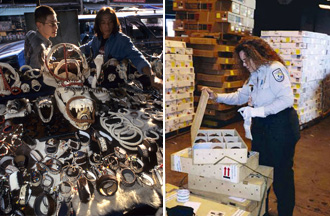On 8 April 2013, the World Tourism Organization (UNWTO) and the United Nations Office on Drugs and Crime (UNODC) agreed to launch a campaign calling on tourists to help reduce demand for illicit goods and services linked to transnational organized crime.
 The campaign, announced earlier this week by UNWTO Secretary General Taleb Rifai and UNODC Executive Director Yury Fedotov in the presence of the United Nations Secretary General Ban Ki-moon, will be launched later this year. Its aim is to raise awareness among international tourists about the type of illicit products offered for sale during their travels. It will also encourage them to make well-informed consumer choices. Wild fauna and flora listed under CITES that is illegally obtained is part of the types of goods that tourists should not buy.
The campaign, announced earlier this week by UNWTO Secretary General Taleb Rifai and UNODC Executive Director Yury Fedotov in the presence of the United Nations Secretary General Ban Ki-moon, will be launched later this year. Its aim is to raise awareness among international tourists about the type of illicit products offered for sale during their travels. It will also encourage them to make well-informed consumer choices. Wild fauna and flora listed under CITES that is illegally obtained is part of the types of goods that tourists should not buy.
The Secretary-General of CITES, John E. Scanlon, warmly welcomed this announcement and stressed that “United Nations agencies play a critical role in supporting the implementation of wildlife conservation efforts, including CITES efforts to combat illegal wildlife trade”. “I am delighted that these two United Nations agencies are moving to take concrete action to support CITES in fighting wildlife crime and reducing international trafficking in endangered and protected species by encouraging tourists and tourist operators to respect the law and make informed choices”.
“The CITES Secretariat is also working closely with UNODC and other partners to usher in a new era where organized gangs involved in wildlife trafficking will face a more formidable and coordinated response so that the criminals who are manipulating uninformed tourists and consumers will be brought to justice”, he added.
The 178 members States to CITES declared the 3rd of March as the World Wildlife Day in Bangkok, Thailand last month to help raise awareness of the need to conserve and use sustainably wildlife.
See also:
- UN agencies announce campaign to better inform tourists about funding of illicit goods
- CITES conference takes decisive action to halt decline of tropical timber, sharks, manta rays and a wide range of other plants and animals
- World Wildlife Day proposal at CITES CoP16
- The International Consortium on Combating Wildlife Crime (ICCWC)